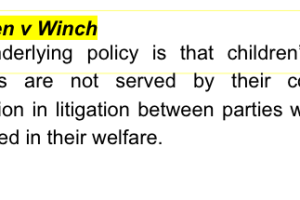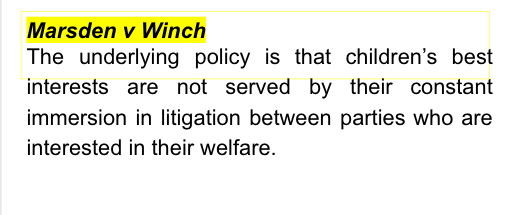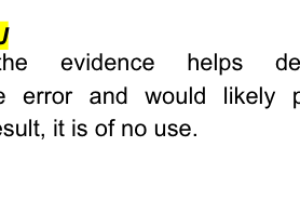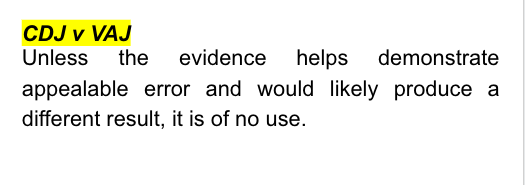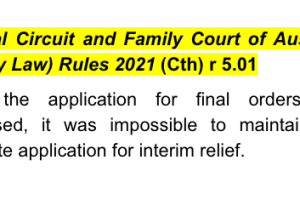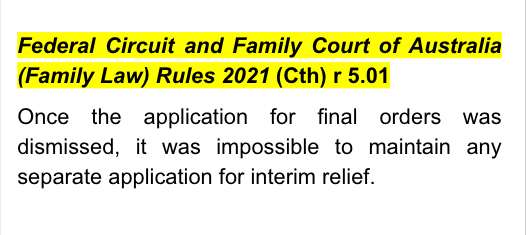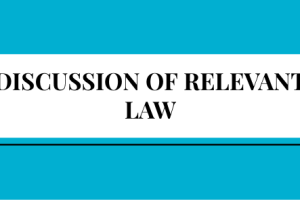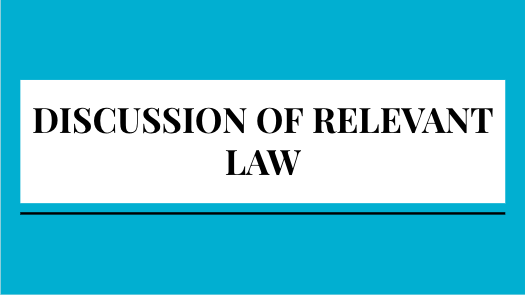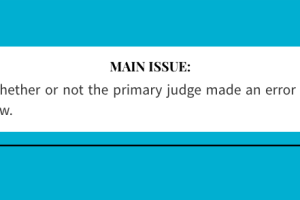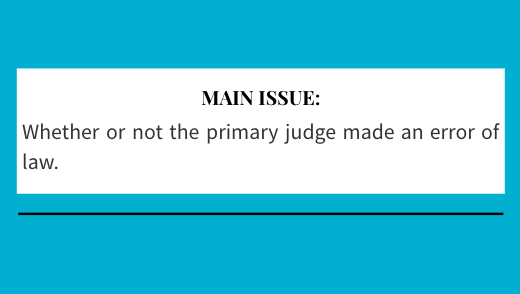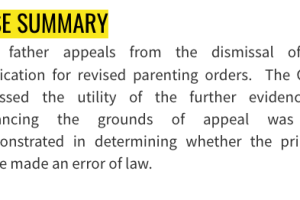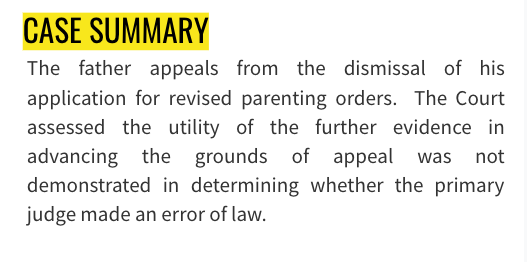- · 4760 friends
Father Opposes Parenting Orders

Kelly & Otto [2022] FedCFamC1A 144 (13 September 2022)

The father appeals from the dismissal of his application for revised parenting orders. The Court assessed the utility of the further evidence in advancing the grounds of appeal was not demonstrated in determining whether the primary judge made an error of law.

Facts
The parties married in 1999 and finally separated in 2011. The parties’ children were born in 2009 and 2011. At the time the appealed dismissal order was made, they were aged 13 and 11 years respectively. Orders were first made between the parties in respect of the children under Pt VII of the Family Law Act 1975 (Cth) (“the Act”) in August 2017 with their consent, providing for the parties to have equal shared parental responsibility for the children, for them to live with the mother, and for them to spend substantial and significant time with the father.
The father wrote to the mother seeking her agreement to some variation of the orders, which she repeatedly rejected. Eventually, in August 2021, four years after the orders were made, the father filed an application to begin fresh proceedings seeking to vary the existing orders. In the main, he proposed that the children instead live with the parties for equal time, even if that regime was to be achieved by a gradual process of change. The mother resisted the application and sought that it be dismissed for lack of any material change in circumstances.
The changes that have occurred since the orders were made the father says are as follows: a. The father has re-partnered and has two young sons aged 2 and 4. The current arrangements mean the children are unable to share a close bond with their siblings; b. The children’s expressed wishes to have more time with him; c. The behavioural issues exhibited by the parties’ son [the younger child], which affects his academic progress and is not adequately addressed by the mother; d. The mother’s partner has physically disciplined [the younger child] in an inappropriate manner; e. The parties have had disagreements about the correct interpretation of the final orders; f. The parties are unable to agree which school the children attend; g. The mother refuses to participate in mediation.

Issue
Whether or not the primary judge made an error of law.

Applicable law



Analysis
When the father appeared represented by counsel at the hearing, he well understood the dispute entailed the determination of whether or not his pending application for varied parenting orders should be dismissed pursuant to the principle established by Rice v Asplund, as is revealed by the content of the Case Outline his counsel furnished to the primary judge before the hearing began. The father said it was the children who instigated the discussions in which they told him they wish to spend more time with him. Secondly, he elaborated his concern about the children’s unduly harsh physical treatment by the mother’s partner. However, the evidence in respect of the first two issues added no extra value to the existing body of evidence.
His Honour recited the father’s evidence concerning the children’s expressed wishes to stay longer with him (at [33]–[36] and [65]) and accepted those facts as alleged, but his Honour remained uncertain as to whether the wishes the children expressed to the father were their genuine sentiments or instead more akin to expressions of allegiance which they perceived he liked to hear. While the father’s factual evidence had to be accepted at its highest, that was not so in relation to his inexpert subjective beliefs about the genesis of the children’s expressed views. The mother’s disinclination to negotiate with the father over changes to the existing orders was not a consideration which the primary judge was obliged to take into account as a material change in circumstances. She was legitimately content to abide by the past orders made to settle any controversy.
Conclusion
The Application in an Appeal filed on 22 August 2022 is dismissed. The Second Amended Notice of Appeal filed on 7 July 2022 is dismissed. The appellant shall pay the respondent’s party/party costs of and incidental to the appeal, fixed in the sum of $10,000.


